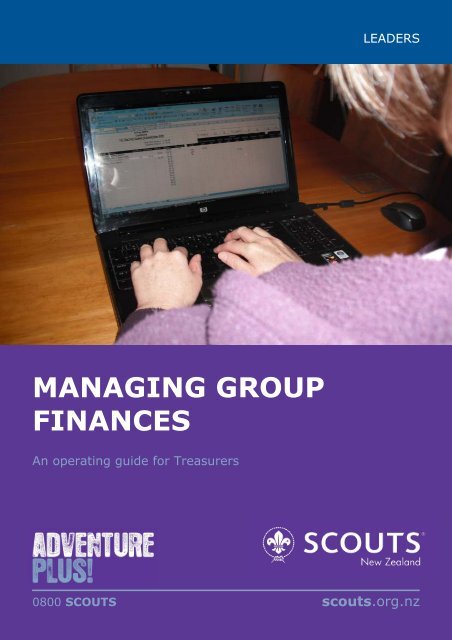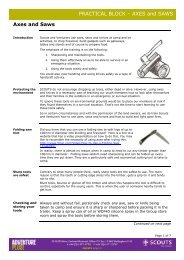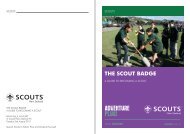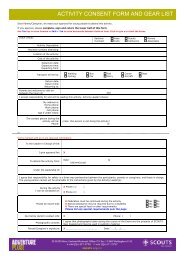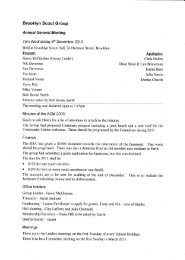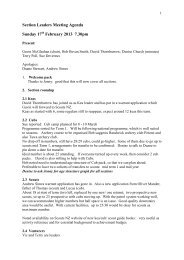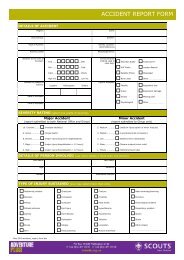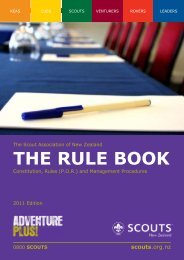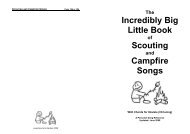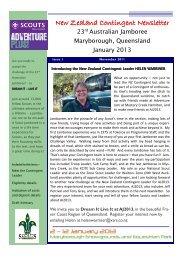managing group finances - Region 1 Scouting - SCOUTS New ...
managing group finances - Region 1 Scouting - SCOUTS New ...
managing group finances - Region 1 Scouting - SCOUTS New ...
- No tags were found...
Create successful ePaper yourself
Turn your PDF publications into a flip-book with our unique Google optimized e-Paper software.
LEADERSMANAGING GROUPFINANCESAn operating guide for Treasurers0800 <strong>SCOUTS</strong> scouts.org.nz
MANAGING GROUP FINANCESOverviewIntroductionThis document provides a list of do’s, don’ts, hints and rules for volunteerstaking on the role of Finance Officer or Treasurer to a Scout Group.The role of Finance Officer or Treasurer is vital as adequate funds and promptreports are needed by the Group Committee and Group Leader in order tomanage and develop the Scout Group effectively.Advice andsupportAdvice and support is available from the <strong>Region</strong>al Service Centre. Contact theZone Leader in the first instance.ContentsThis publication addresses the following topics:TopicSee PageGroup Structure and Executive Team and their Roles 3<strong>SCOUTS</strong> <strong>New</strong> Zealand Rules and Policies 5Annual Budgets 8Grants and Accountability Reports 9Templates 10Subscriptions 11Leaders Expenses 12End of year reporting 13Summary of Financial Requirements for Scout Groups 22PublisherPublished by The Scout Association of <strong>New</strong> ZealandPO Box 11348Wellington 6142Under the authority of the National SecretaryContributors<strong>SCOUTS</strong> <strong>New</strong> Zealand gratefully acknowledges contributions from:David Thorpe with technical advice from Bob Macaulay and based on documentsand forms created by Mike Blackburn.ISBN 0-908680-1 6-3Version 1.4 September 2011Page 2Managing Group Finances – An Operating Guide for Treasurers
The Group Structure and Executive TeamThe GroupStructureThe Scout Group structure is set out as shown in the diagram below. It isimportant to remember that in <strong>SCOUTS</strong> <strong>New</strong> Zealand, the Group Leader is thevolunteer manager of the Scout Group and that the leaders working with theyouth all report directly to the Group Leader (GL).The Committee Chairman leads the committee and also reports directly to theGroup Leader.The Group Leader in turn reports directly to the Zone Leader.Division ofresponsibilitiesThe Leaders working with youth are warranted by <strong>SCOUTS</strong> <strong>New</strong> Zealand whichimplies that they have been judged as suitable to work with youth and havebeen taken through the “Introduction to Scouts <strong>New</strong> Zealand” booklet,understand the information and have accepted the <strong>SCOUTS</strong> “Duty of Care”statement.The Group Committee led by the Chairman or GL are responsible for providingthe Scout Group with the following:1. A meeting place2. Sufficient equipment to allow the sections to operate their programmes3. Adequate funds to operate the Scout Group effectively4. Maintain accurate and timely financial records and reports5. Protect the assets of the Group6. Assist the Group Leader to recruit leaders as required.Continued on next pageManaging Group Finances – An Operating Guide for Treasurers Page 3
The Group Structure and Executive Team, ContinuedCommitteeRolesThere are no hard and fast rules as to how the committee operates butexperience shows that the following key roles share the work fairly andeffectively.1. Chairperson: – Sometime a GL will choose to act as the Chairpersonbut bigger Scout Groups are strongly advised to appoint a CommitteeChairperson who then leads the committee and reduces the workload forthe Group Leader.2. Treasurer: - an essential role in the Group. Someexperience with sets of accounts and basicaccounting principles are needed. Time to do theaccounts and related tasks is also essential, aswithout up to date sets of financial records thecommittee and leaders cannot confidently planactivities unless they know that finance isavailable and the expenses are budgeted for.3. Membership Officer: - An optional appointment and one that is oftencarried out by the Treasurer in smaller Groups. The role involves:a. Provide the Treasurer with data for generating the parentsinvoices for subscriptionsb. maintaining membership records and updating the National webbased membership database4. Hall Officer: - An optional appointment that involves:a. arranging any maintenance and cleaning needed on the hall andsurrounding propertyb. taking and <strong>managing</strong> bookings for the hallc. recording and issuing keys for the hall5. Fundraising officer: - A person with good organizing skills and flair,who can help the Group take advantage of the fundraising initiativesorganized by <strong>SCOUTS</strong> <strong>New</strong> Zealand and other organizations.Treasurer’sroleThe Group Treasurer’s role in smaller Scouts Groups often includes being theMembership Officer and Fundraising Officer as well. However, in the largerGroups, the Treasurer’s role needs to be focused on key finance orientated tasksand the membership and fundraising roles allocated to others. The key tasksfor the Treasurer are:1. To manage the Group Bank Account and financial affairs in accordancewith <strong>SCOUTS</strong> <strong>New</strong> Zealand policies and rules2. Produce accurate and timely financial reports for each committeemeeting. This includes tabling a copy of a current bank statement.3. Bank all subscriptions and other cash received promptly4. Receipt all income as it’s received5. Pay all accounts by the due date6. Keep track of income and expenses as compared to the budget andadvise the GL and Chairman if shortfalls in funding or unauthorizedexpenses trends are starting to show up.7. Work closely with the Chairman and the GL so there are no surprises inrespect to the financial affairs of the Group.Page 4Managing Group Finances – An Operating Guide for Treasurers
<strong>SCOUTS</strong> <strong>New</strong> Zealand Rules and PoliciesThe Rule Book<strong>SCOUTS</strong> have a Rule Book that is in three parts and sets the standards requiredof the members. They can be downloaded from the <strong>SCOUTS</strong> website free ofcharge. The parts are:1. The Constitution.2. Policy, Organisation and Rules.3. Management procedures.Group Leaders and their teams are expected to be conversantwith the rules and be able to locate them in the Rule Book ifrequired when enforcing the standards of the Movement.Group Treasurer’s are encouraged to logon to the <strong>SCOUTS</strong> <strong>New</strong> Zealand websiteand become familiar with the rules relating to finance and the fact sheetsrelating to financial matters which include:• Management of Bank Accounts and Avoidance of Fraud• Security of cheques• InsuranceThese are available on the National website.SignatoriesScout Groups are directed to have a minimum of two signatories to operate abank account. Three or more signatories are preferable to cover absences dueto sickness or holidays etc. One of the signatories must be the Group Leader.Scout Groups must operate a bank account with more than onesignatory.The Treasurer is responsible for arranging the signatories with the bank andgetting the Scout Group Committee’s approval for any changes.InternetbankingScout Groups may and are encouraged to use internet banking facilities, butwith the proviso that the account offered by the bank requires an approvalprocess.In effect this means that the Treasurer sets up the payments on line and thenthe GL or other committee member must log on, check the payments set up arevalid and approve them before the payments are processed. This complies withthe more than one signatory requirement.Hint:A number of Scouts Groups using internet banking give thecommittee members view only access to the bank account sothat they can see what transactions have taken place. Thisprovides total transparency and helps promote trust amongstthe committee and leaders.Continued on next pageManaging Group Finances – An Operating Guide for Treasurers Page 5
<strong>SCOUTS</strong> <strong>New</strong> Zealand Rules and Policies, ContinuedOne mainBank AccountScout Groups should only operate one bank account. There are generally onlytwo exceptions to this rule:• Where the Group has sufficient funds to opena Term Investment Account.• Where the Group has a Venturer Unit a subaccount may be opened.Financial transactions for other Sections in the Groupshould take place through the main account. Thename of the Bank Account must be in accordance withthe following format:The Scout Association of <strong>New</strong> Zealand XYZ GroupRegistration with the Charities Commission is in the name of “The ScoutAssociation of <strong>New</strong> Zealand” which must be included in the Bank Account title.Event bankaccountsAn account opened for a special event such as a Jamboree may not be practicalas a sub account to the main Scout Group bank account. This is because fundsneed to be drawn from the account at the event, which may be some distanceaway from home.The two or three additional signatories need to be people at the event and donot need access to the Scout Group’s main bank account.Note that there is no provision in the rules for <strong>SCOUTS</strong> to set up a bank accountfor a special event such as Jamboree where several Scout Troops are combiningto form a composite troop to attend the event.One Scout Group must take responsibility for overseeing the bank account onbehalf of the other Groups.The name of the account must still conform to the format shown on thepreviously. E.g. The Scout Association of <strong>New</strong> Zealand XYZ GroupJamboree A/c.FundsreceivedAll funds received must be banked so that there is a record of the funds passingthrough the bank account. There must be no exceptions to this rule. It’sessential that the financial transactions of the Group are transparent and can befollowed by any committee member, leader or auditor.PaymentsmadeAll payments must also be made by cheque or internet direct payment so thatthe transaction appears on the bank statement and can be traced.ApprovalprocessAll payments must be approved by the Group Committee and may be approvedin advance and then ratified at a subsequent meeting.The purpose of this is so the Treasurer can pay accounts by the due date andnot delay payment until the next committee meeting. This assumes that theperson purchasing the goods received approval from the committee to purchasethe goods at a specific price before making the purchase.If a Group is hoping to negotiate good prices for materials then they are morelikely to do so if the supplier knows payment will be made on time.Continued on next pagePage 6Managing Group Finances – An Operating Guide for Treasurers
<strong>SCOUTS</strong> <strong>New</strong> Zealand Rules and Policies, ContinuedInvestmentaccountsScout Groups are encouraged to invest surplus funds but the account must bewith their own bank or another registered bank.Scout Groups may not invest funds with investment companies or otherorganizations.Groups are welcome to seek the advice of the National Property and FinanceManager at the <strong>SCOUTS</strong> <strong>New</strong> Zealand National Office in Wellington on this andother financial topics.Loaning fundsScout Groups must not lend funds to individuals such as committeemembers and leaders under any circumstances.“Advances” may be made to leaders before an activity. Refer to “Leadersexpenses”.GuaranteesScouts Groups may not act as a guarantor for other Groups or individuals withinor outside the Scout Group.TrusteesScout Group members may not enter in to a Trustee arrangement without priorconsultation with the National Property and Finance Manager, via the Zone and<strong>Region</strong>al Development Manager.Trustees are personally liable for any debts incurred by the trust and must beaware of this.Audits /reviews<strong>SCOUTS</strong> <strong>New</strong> Zealand requires each <strong>group</strong> to have the annualaccounts reviewed by a competent accountant or person with afinancial background. A full audit is not necessarily required.A copy of the annual accounts must be provided for the Zone Leaderso they are fully aware of the Group’s financial position.AnnualAccountsThe <strong>SCOUTS</strong> <strong>New</strong> Zealand financial year ends on 30 th September.• Groups are required to prepare their annual accounts, have themreviewed and then presented to the Group Annual General Meetingbefore the 31 st December each year.• It’s customary to invite a Zone representative to attend the AnnualGeneral Meeting.• Copies of the annual accounts should be available for each personattending the AGM.Insurance<strong>SCOUTS</strong> <strong>New</strong> Zealand on behalf of all Groups maintain a five million dollarpublic liability cover. A certificate is available on the National Website.(downloads/publications/factsheets/Scouts_NZ_Public_Liability)Scout Groups are responsible for maintaining adequate insurance on buildingsand contents, camping and marine equipment etc.A fact sheet on insurance is available on the National Website.Continued on next pageManaging Group Finances – An Operating Guide for Treasurers Page 7
Annual BudgetWhy have abudgetIt’s prudent to work out a budget for the coming financial year so that theCommittee has some idea of the financial needs of the Group and can plan andorganize to meet those needs.Getting abudget startedAn effective but simple method of creating a budget is to take the last yearsstatement of Income and Expenditure and use those figures to create thebudget.Then add and subtract from those figures in line with what you know is likely tooccur during the coming year. E.g. Jamboree, summer camp, canoe trip, hallmaintenance and so on.Working withthe leadersMeet with the GL and the leaders of the individual sections and listen to theirplans for the coming year. Agree with them on a reasonable sum to include inthe budget that will meet part or all of their needs.As the year progresses, inform them of how their costs are going in comparisonto the budget and give them adequate warning if they are exceeding the totalallocated.It may be necessary to point out to them that they agreed to the budget value ifthey are in danger of exceeding the budgeted sum.This puts the responsibility on the leaders to operate within the agreed amountand not necessarily cast the committee as being unhelpful.Page 8Managing Group Finances – An Operating Guide for Treasurers
Grants and Accountability ReportsApplying forgrantsWhile this role is best allocated to a member of the committee responsible forfund raising, often it is the Group Treasurer who ends up completing the GrantApplication, as they have to provide all the financial data that is required for theapplication.<strong>SCOUTS</strong> <strong>New</strong> Zealand has access to the FUNDVIEW website that lists all theCharitable Trusts and can provide you with the logon and password should youneed it.Pay particular attention to the requirements and the criteria specified by theapplication form and the trust purpose. The best-prepared application in theworld will not succeed if the Trust doesn’t fund the type of activity you areapplying for.Do include photos of activities and a copy of the “Introduction to <strong>SCOUTS</strong> NZ”booklet, as not all the people working for the Trust will be knowledgeable about<strong>SCOUTS</strong> or our aims and methods.AccountabilityreportThis report is critical. You are required to complete a report to the CharitableTrust on how you spent the funds etc. Make sure you complete it on time anddo send them photos and supporting news clips etc to show how successful theevent or project was.All the charitable Trusts communicate with one another to monitor who is doingwhat with the funds provided. Failure to complete a timely Accountability Reportcan and has resulted in <strong>SCOUTS</strong> NZ being put on a black list.This means that because one Group failed to complete an Accountability Report,every Scout Group in NZ is denied access to funds via grants until such time asthe offending Scout Group completes the report.http://www.fundview,co,nzManaging Group Finances – An Operating Guide for Treasurers Page 9
Leaders ExpensesBackgroundSection leaders in Scouts frequently need to purchase equipment and materialsfor the section programmes. It is acknowledged that it can be difficult at timesto provide the funds in a timely manner so that they can have the cash on handwhen needed.The general approach is that leaders should not need to use their own familyfunds to pay for programme equipment for the section’s programmes.PossiblesolutionsThere are several possible solutions to providing timely funds but all requirecareful monitoring and scrupulous checking of receipts and vouchers to ensurethe claims are genuine. All options require good planning so that nothing is leftto the last minute.• All the options require the expense to be budgeted for and the priorapproval of the committee to make the purchase. Ideally the Leadersconcerned will advise the GL at least a week in advance or preferablytwo, of the required funds, what they are for and providing severalquotes.• The GL passes the request to the Treasurer who checks that thepurchase has been budgeted for. The Treasurer subsequently tables therequest at the next committee meeting so there is a record of theapproval and the payment.Option one:Once the request for funds has been received and approved by both GL and theTreasurer:1. The Treasurer makes a direct payment to the Leaders personal bankaccount.2. The leader must subsequently provide dockets, invoices or vouchers forthe purchase to the value of the advance.3. Any surplus must be returned to the Treasurer.It‘s suggested that payments to the leaders be made just prior to the need forthe purchases to avoid situations where the leader inadvertently spends thefunds on family needs and doesn’t have them available for Scouts when needed.Option two:The leader can arrange to get a personal bank travel card (debit card) and theTreasurer deposits the sum requested and approved into that account just priorto the purchase.• The leader submits the monthly statement to the Treasurer with thereceipts and vouchers supporting the transactions attached.• Any surplus stays on the card and is used for subsequent approvedpurchases.• A leader making personal purchases on the card must refund theexpense to the Group, and the Treasurer and GL should then considerwhether or not to deposit any further funds to the card.Option three:The Treasurer is able to get a second signatory quickly in order to sign a chequemade out for the correct amount and to a specific supplier and give it to theleader promptly for an approved expense. The leader then gives the suppliersinvoice to the Treasurer.Option four:Obtain the suppliers bank account so that an amount can be direct credited priorto collecting the goods or services.Page 12Managing Group Finances – An Operating Guide for Treasurers
End of Year Reporting for Scout GroupsThe Scout Association of <strong>New</strong> Zealand’s financial year starts on the 1 st October and end on the 30 thSeptember. All Zone, Group and Branch accounts need to be prepared to these dates.Scout Groups are required to hold an Annual General Meeting (AGM) within three months of theend of the Financial Year (which effectively means before the end of Term Four). Groups mustinvite the Zone Leader, all Adult Leaders within the Group and all Parents / Guardians of Youthmembers to this meeting. Notice of such a meeting must be in writing and be made at least 14days prior to the meeting.At this meeting the Group Treasurer will present the Financial Accounts for the Group, the GroupLeader and Section Leaders will present their reports and a Group Committee will also be elected.A copy of the Financial Report must be presented to the Zone Leader.End of Year Financial ReportThis report will include:Statement of Financial Performance (Income and Expenditure Statement)The Statement of financial performance is a summary of the financial transactions for theGroup for the preceding financial year. (In business terms this is often called a Profit andLoss statement)All income including Fees, Fundraising, Camp Fees, and other activities must be included.All expenses including Electricity, Insurance, Maintenance, Group Expenses, NationalLevies and all other expenses must be included.This will show whether the Group has made a Surplus (profit) or Deficit (loss) for the yearStatement of Financial Position (Balance Sheet)A Statement of Financial Performance is a summary of Assets and Liabilities of a Group.Assets are the things (expressed in dollar terms) that a Group owns, and can be furtherbroken down into:Current assets. These are things like money in the bank, petty cash given to leaders butunspent, accounts receivable, badges, books and other things owned by the GroupNon current assets. These are things like the Scout Hall, Tents and all other significantequipment owned by the GroupLiabilities are things (expressed in dollar terms) that the Group owes to others, and isshown as follows:Current liabilities. This is generally any outstanding accounts that the Groupneeds to pay soon.Members Equity. This amount represents the amount of money that has beengenerated by the members of the Group. (Any surplus accumulated from previousyears)The Groups Assets must equal their Liabilities (which is the reason why it is called aBalance Sheet)Continued on next pageManaging Group Finances – An Operating Guide for Treasurers Page 13
End of Year Reporting for Scout Groups, ContinuedList of Assets and DepreciationThis list of assets really refers to the Non Current assets owned by the Group.The Groups Quartermaster should keep a list of all of the equipment owned by the Group,and this should be used as the basis for the List of Assets.As a general rule, you should only be reporting assets with a value of over $500, so thereis no need to individually list the number of pots and pans or sports equipment the Grouphas. This might be listed all together against one-dollar amount.Depreciation is a little more difficult to explain.Because Scout Groups are exempt from paying tax, there is no need to account fordepreciation on the Statement of Financial performance (Income and Expense Statement).However because the real value of assets such as tents and other equipment does godown (depreciates) over time (a tent purchased a couple of years ago for $1,000 will beworth much less today), this depreciated figure does need to be reflected in the Statementof Financial Position (Balance Sheet).Generally assets should be depreciated at 20% per annum on the diminishing value or10% per annum straightline. This gives your $1,000 tent an approximate life of 10 yearsbefore it is considered to be of no value (as far as the Balance sheet is concerned).Valuation of AssetsNon Current (Fixed) Assets owned by the Scout Group may include the following:• Land – if owned by <strong>SCOUTS</strong> <strong>New</strong> Zealand• Buildings – Scout hall• Camping and hall equipment• Marine equipment – boats, canoes etcLand should be valued at current rating valuation.Buildings should be revalued regularly and particularly after extensive repairs oralterations.Camping, hall and marine equipment should be revalued annually.The adjustment valuation is made through the Revaluation Reserve Account and isreflected in the Balance Sheet. An increase in value increases the balance in both the AssetAccount and the Revaluation Reserve. A decrease in value decreases the balance in boththe Asset Account and the Revaluation Reserve.For Audit or review purposes a note and or working papers should detail any annualadjustments.Statement of Review by a suitably qualified personThe Associations Rules allow for Groups to have their Accounts Reviewed (as opposed toformally Audited). By law, an Audit can only be carried out by a Chartered Accountant, andis a complete financial analysis of the Groups financial transactions. The biggest problemfor Groups in getting an Audit done is the cost. To have a full Audit carried out will cost inthe vicinity of $2,000.Alternatively, the other option is to have a Review. This is where a “suitably qualified”person looks over the Groups accounts to determine that all of the required statementsbalance and all financial activities have been accounted for. Although a Review will costsignificantly less than an Audit, a Review does not go into the same depth of analysis, andtherefore will not guarantee to pick up mistakes and any potentially fraudulent activities(however it is suitable to the Association at a Group level).Although the “suitably qualified” person does not have to be a registered Accountant, itmust be someone who has a fundamental understanding of accounting practices andtherefore shouldn’t be “the guy next door”.Continued on next pagePage 14Managing Group Finances – An Operating Guide for Treasurers
End of Year Reporting for Scout Groups, ContinuedCopy of the most recent Bank StatementsGroups should only operate one Bank account. There are two possible exceptions to this.1. Where a Group has sufficient cash that they wish to have a savings orinvestment account or,2. Where a Venturer Unit is operating its own bank account.All Bank statements for the previous financial year will required by the person carrying outthe Review of the Groups accounts as one way of verifying the income and expenses of theGroup.Providing a copy of the Groups most recent Bank statement (to the 30 September) withthe Groups Financial Report is a way of showing that the Name of the Account is correct(in line with the rules of the Association) and that the amount of money in the bank is inline with what is listed in the Groups Balance Sheet.Photocopy of the Groups Insurance Policy (both Material Damage and Contents asappropriate)The Scout Association of <strong>New</strong> Zealand requires all Scout Groups to have adequateinsurance on their Hall and equipment.Annual ReportAt a Groups AGM, each Section and the Group Leader should present a written report tothe meeting on what has been achieved in the preceding year. Ideally these reports shouldinclude photos of some of the events and activities that the Section has done throughoutthe year.Not only does this provide a summary to all other sections and members of the Group, italso serves as a historical document, which the Group can look back on in years to come.Continued on next pageManaging Group Finances – An Operating Guide for Treasurers Page 15
End of Year Reporting for Scout Groups, ContinuedXYZ SCOUT GROUP(Example)FINANCIAL STATEMENTSFor the financial year ending30 September 20XXContinued on next pagePage 16Managing Group Finances – An Operating Guide for Treasurers
End of Year Reporting for Scout Groups, ContinuedINCOME AND EXPENDITURE STATEMENTXYZ SCOUT GROUPSTATEMENT OF FINANCIAL PERFORMANCEFOR THE YEAR ENDED 30 th September 20XXNotes 20XX 20IXINCOME $ $Subscriptions and Fees 1 8000 7300FundraisingChocolate sales 1850 600BBQs 590 401Car wash 2 0 423Grants and donations 3Local Community Trust 1500 1100COGS 950 0Mrs Smith 500 500Hall and equipment hire 4 2735 400Interest received 130 76Camps and Activities 1800 1200Other incl asset sales 100 0Total Income 18155 12000EXPENSESAccommodationPower 800 700Rates 200 200Water 112 112Cleaning 200 150Insurance 900 900Repairs and Maintenance 1350 1750Group ExpensesBooks, Badges and Scarves 5 952 406National Levies 7 5162 3950Kea Section 167 82Cub Section 120 100Scout Section 112 300Venturer Section 0 0Training 27 39Uniforms 251 510AdministrationPostage, Stationery, Copying 54 48Computer expenses 110 10Meetings 205 210Sundry Expenses 245 180Total Expenses 10967 9647Total Surplus (deficit) 7188 2353Note: This statement must be read in conjunction with “Notes to the Financial Statements”Continued on next pageManaging Group Finances – An Operating Guide for Treasurers Page 17
End of Year Reporting for Scout Groups, ContinuedXYZ SCOUT GROUP BALANCE SHEETSTATEMENT OF FINANCIAL POSITIONAS AT 30 th September 20XXNotes 20XX 20IXACCUMULATED FUNDS AND RESERVES $ $Accumulated Funds 10483 7130Current years Operating Surplus 7188 2353Asset Revaluation Reserve 292600 291200Total 310271 300683These funds are represented by:CURRENT ASSETSBNZ Current Account 6871 3983BNZ Investment Account 10000 5000Accounts Receivable 6 800 500Total 17671 9483NON CURRENT ASSETS (at valuation)Buildings – Scout Hall 270000 270000Camping & Hall Equipment 22000 20000Canoes 600 1200Total 292600 291200TOTAL ASSETS 310271 300683LESS LIABILITIESCreditors and Accruals 0 0GROUP NET ASSETS 310271 300683Continued on next pagePage 18Managing Group Finances – An Operating Guide for Treasurers
End of Year Reporting for Scout Groups, ContinuedFIXED ASSET AND VALUATION SCHEDULEFixed assets belonging to the XYZ Scout Groups as at 30 September 20XXItemDatePurchasedOriginalCostOpeningBookValueDepreciationRate %Amount ofDepreciation$ $ % $ $$ $ % $ $$ $ % $ $$ $ % $ $$ $ % $ $$ $ % $ $$ $ % $ $$ $ % $ $$ $ % $ $$ $ % $ $$ $ % $ $$ $ % $ $$ $ % $ $$ $ % $ $$ $ % $ $$ $ % $ $$ $ % $ $$ $ % $ $$ $ % $ $$ $ % $ $$ $ % $ $$ $ % $ $$ $ % $ $$ $ % $ $$ $ % $ $$ $ % $ $$ $ % $ $$ $ % $ $ClosingBookValueTotal book value of the assets owned by theGroup$Items disposed of during this financial yearItemDatePurchasedClosingBook ValueIf asset iswritten offenter an *Proceedsfrom Sale$$$$$Total included in income as asset sales $Continued on next pageManaging Group Finances – An Operating Guide for Treasurers Page 19
End of Year Reporting for Scout Groups, ContinuedNOTES TO THE ACCOUNTSXYZ SCOUT GROUPNOTES TO THE FINANCIAL ACCOUNTSAS AT 30 th September 20XXNote1 Subscriptions and FeesThe Group charges $40 per Youth Member per Term or $140 if paidat the beginning of the year. The Group has approximately 53 Youthand expected income from Subscriptions and Fees is between $7430and $8450. This years accounts show $8,000 collected. There is anamount of $800 in Outstanding Fees as at the balance date. Thisamount appears on the Groups Balance Sheet as AccountsReceivable (Note 6)2 Car WashThis year the Group decided not to run its annual Car Wash,choosing instead to focus on selling Chocolates.3 Grants and Donations$1,500 was received from the Canterbury Community Trust to assitswith Insurance and Maintenance around the Hall. $950 from theCOGS (Community Organisation Grants Scheme) is for theInsurance and again Mrs Smith gave the Group a donation of $5004 Hall and Equipment used by other organisationsThis year the Committee agreed to let the hall out to a local AikidoClub for two hours on Thursdays afternoons when the Hall is notbeing used by the Group. The Aikido Club is paying a donation of$50 per week (they only use the hall for weeks during school terms(40) so the total income is $2,000). The remainder of the moneysomes from other casual letting of the hall.(Note: Groups leasing land from the some local Councils are notable to hire out their hall. They may however agree on a donation tocover the cost heating, lighting, water and maintenance)5 Books Badges and ScarvesLeaders have been actively working on the Youth Award Schemeand the number of Badges being earned by Youth has increasedsignificently. However the Group Leader and the Group Committeefeel that this is worthwile expenditure and are encouraging all Youthto achieve more badges.6 Accounts ReceivableThe outstanding amount of $800 is entirely made up of Group Fees7 National LeviesThe 20IX year’s National Levies was based on 50 youth members at$79 ($3,950). The 20XX year as based on an increase in youthnumbers to 58 and the National Levy being increased to $89($5,162)Continued on next pagePage 20Managing Group Finances – An Operating Guide for Treasurers
End of Year Reporting for Scout Groups, ContinuedSTATEMENT OF REVIEWTo the Committee and Members of the XYZ Scout GroupI have examined the financial statements for the XYZ Scout Group. In addition I and haveobtained such information and explanations as I considered necessary to conduct a review of theGroups <strong>finances</strong> as at the 30 September 20XX.Committee’s responsibilitiesThe Group Committee is responsible for the preparation of a Financial Report, which fairly reflectsthe financial position of the Group for the previous financial year.Reviewer’s responsibilitiesIt is the reviewer’s responsibility to express an independent opinion on the financial reportpresented by the Group CommitteeThis review has been conducted in accordance with the generally accepted practices of financialreview standards in <strong>New</strong> Zealand.Reviewer’s recommendationsNo recommendations have been made.Unqualified OpinionControl over cash revenues prior to being recorded is limited and there are no practical proceduresto determine the effect of this limited control. In this respect alone I have obtained all theinformation and explanations as practically possible.In my opinion the Financial Report attached fairly reflects the financial position of the XYZ ScoutsGroup as at the 30 September 20XX and the results of its operations for the year ended on thatdate.Name / SignedAddressDateManaging Group Finances – An Operating Guide for Treasurers Page 21
Summary of Financial Requirements for Scout GroupsIn summary, the following applies to all Scout Zones, Groups and Branches that operate under thename of The Scout Association of <strong>New</strong> Zealand.• The financial year for the Association runs from 1 October to the following 30 September• All Branches within the organisation will prepare an annual Financial Report. This reportshall include:ooooooStatement of Financial Performance (income and expense statement)Statement of Financial Position (balance sheet)Asset and Valuation schedule (asset register)Statement of Review (by an independent person)Photo copy of the most recent Bank statement for each Bank Account the BranchoperatesPhoto copy of Building Insurance Certificate• Groups will hold an Annual General Meeting and present their Financial Report to the ZoneLeader within three months of the end of the financial year (i.e. before the end of TermFour).• An example for the layout of the Report has been supplied in this publication.• Groups can conduct a Review of their annual accounts rather than a formal Audit• The Group Leader has the overall responsibility for all funds held by the Group (where aGroup does not have a formally appointed Group Leader, the Zone Leader takes on thisresponsibility)• All Accounts must be in the name of the Scout Association of <strong>New</strong> Zealand, followed by thename of the Group.E.g. Scout Association of <strong>New</strong> Zealand XYZ Scout Group• No Bank Account can be opened in the name of the Association without the writtenapproval of the Zone Leader• Groups should only operate one Bank Account. There are generally only two exceptions tothis rule:o Where a Group has sufficient funds to warrant a Term Investment Account.o Where a Group has a Venturer Section• All Accounts in the Association’s name must have two signatories jointly to draw funds (theGroup Leader must be a signatory to all Accounts). Most <strong>group</strong>s will have two or threeother people as signatories including the Treasurer, Chairperson, Secretary and possiblyanother Leader as well. Any two of the nominated persons are eligible to jointly authorisepayments• Groups are not allowed to operate Cashflow Cards or any other form of card allowing asingle PIN to transact on the Group Account• All monies spent on behalf of the Group must be supported by receipts presented to theGroups Treasurer• Groups may choose to give petty cash to Leaders on a term-by-term basis, receipts mustbe presented to support the money spent before the next terms money can be issued.• All cash received as payment for Fees, Camps etc must be banked into the Groupsaccount. Under no circumstances should any cash received as payment to the <strong>group</strong> beused for any purchase, payment or reimbursement.The Group Treasurer must present a financial report with relevant bank statements to the GroupCommittee at least once a term. Most Groups will require this to be done monthly.Page 22Managing Group Finances – An Operating Guide for Treasurers
Managing Group Finances – An Operating Guide for Treasurers Page 23
NATIONAL OFFICE<strong>SCOUTS</strong> <strong>New</strong> ZealandPO Box 11348Wellington 6142<strong>New</strong> Zealandscouts.org.nz0800 <strong>SCOUTS</strong>© Copyright. May not be reproduced for sale.REGISTERED CHARITY CC10556Page 24Managing Group Finances – An Operating Guide for Treasurers


